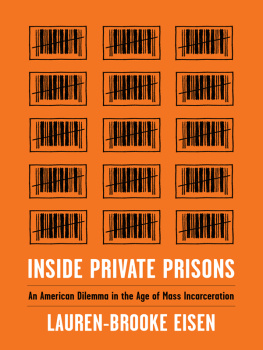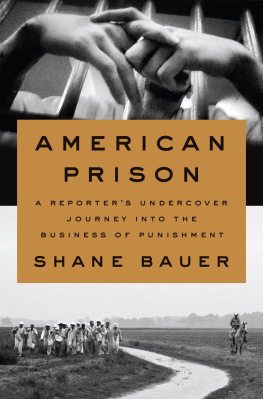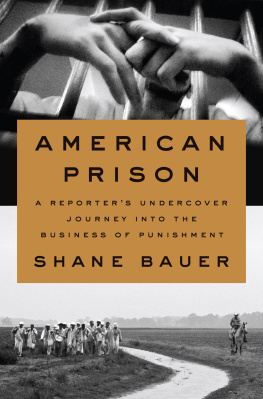Prison Privatization
THE MANY FACETS OF A CONTROVERSIAL INDUSTRY

VOLUME I: THE ENVIRONMENT OF PRIVATE PRISONS
Byron Eugene Price
John Charles Morris

Copyright 2012 by Byron Eugene Price and John Charles Morris
All rights reserved. No part of this publication may be reproduced, stored in a retrieval system, or transmitted, in any form or by any means, electronic, mechanical, photocopying, recording, or otherwise, except for the inclusion of brief quotations in a review, without prior permission in writing from the publisher.
Library of Congress Cataloging-in-Publication Data
Prison privatization : the many facets of a controversial industry / Byron Eugene Price and John Charles Morris, editors.
v. cm.
Contents: v. 1. The Environment of private prisons
Includes bibliographical references and index.
ISBN 978-0-313-39571-0 (hbk. : alk. paper) ISBN 978-0-313-39572-7 (ebook)
1. PrisonsUnited States. 2. PrivatizationUnited States. 3. CorrectionsContracting outUnited States. I. Price, Byron Eugene. II. Morris, John Charles.
HV9469.P747 2012
338.47365dc23 2012024729
ISBN: 978-0-313-39571-0
EISBN: 978-0-313-39572-7
16 15 14 13 12 1 2 3 4 5
This book is also available on the World Wide Web as an eBook.
Visit www.abc-clio.com for details.
Praeger
An Imprint of ABC-CLIO, LLC
ABC-CLIO, LLC
130 Cremona Drive, P.O. Box 1911
Santa Barbara, California 93116-1911
This book is printed on acid-free paper
Manufactured in the United States of America
This book is dedicated to my mother, Mabel E. Price, for being my inspiration.
Byron E. Price
This book is dedicated to my wife, Elizabeth Dashiell Morris, for her love and support.
John C. Morris
Contents
Byron E. Price and John C. Morris
Matthew T. King
Younhee Kim
Tiffiney Barfield-Cottledge
Yijia Jing
Robert C. Kenter and Susan V. Prior
John C. Morris
Henrie M. Treadwell
Matthew T. King
Leslie Taylor-Grover, Eric Horent, Juarod Cal, and Vernard Sterling Jr.
RaJade M. Berry-James
Anne Lee
Earl Smith and Angela Hattery
Katharine A. Neill, John C. Morris, and Byron E. Price
Acknowledgments
Editing a three-volume book series is, without a doubt, a group effort, and the end result is the culmination of the work of many people. We wish to thank Michael Wilt, Valentina Tursini, and Beth Ptalis, our editors at ABC-CLIO, for their help and endless patience in dealing with questions, changes, and technical issues. We are very grateful for their support. We would also like to thank our copyeditor, Betsy Crist, for her tireless work in turning this manuscript into a reality.
We are also very grateful to our many contributors who not only wrote the chapters in this volume but also endured many rounds of edits and changes, and who waited patiently while we brought the project to fruition. We would also like to thank Matt Gable for his wonderful technical support and Katie Neill for her meticulous editing. We also thank Brittni McCrimmon and Casey Smith for their help keeping the many versions of manuscripts organized and available to us along with the team at BookComp, Inc. who put this book into pages. Without the support of all these people, this project would have forever remained an idea in our minds. We are indebted to all of you.
Byron E. Price and John C. Morris
Introduction
The Environment of Private Prisons
Byron E. Price
John C. Morris
The past four decades have witnessed a worldwide movement toward the privatization of goods and services traditionally provided, produced, and delivered by government. While privatization is certainly not a new phenomenon, a renewed emphasis on free market capitalism, coupled with ideologically driven desires to make government smaller, less costly, and less intrusive, have led governments at all levels to seek alternative solutions to the delivery of their services. In the United States, these forces were coupled, beginning in the late 1970s, with a grassroots antitax movement. Originating in the form of a property tax revolt in California, this movement quickly spread around the country and produced added pressures for governments to do more with less.
E. S. Savas (1987, 3) defines privatization as the act of reducing the role of government, or increasing the role of the private sector, in an activity or in the ownership of assets. An early proponent of privatization, Savas identifies four forces underpinning the movement toward privatization. Pragmatic forces are interested in better government and believe privatization will lead to more efficient public services. Ideological forces are concerned with the size and power of government and do not trust the governments ability to make good decisions. Commercial forces want to expand the size of the private sector by reducing governments role in the economy. Finally, populist forces believe market choice and community empowerment are superior to choices made via indirect democracy (Savas 1987, 410).
Privatization has been present in the United States since the founding of our nation. George Washingtons army purchased ammunition, clothing, food, and shoes from private sector merchants. Roads and bridges were often built by contracted construction workers. As state and local governments began to provide more goods and services to their citizens, many of these services, at least in part, were contracted out to private companies. In 1984, a survey of nearly 1,800 local governments in the United States conducted by the International City Management Association identified nearly 70 categories of services privatized by these governments, including services ranging from public works to parks and recreation to labor relations. A similar picture emerges when one examines the use of privatization at the state government level.
More recently, scholars have begun to turn their attention to both the underpinnings of privatization arguments and the impacts of privatization on citizens and governments alike. Although some scholars have concluded that privatization has fulfilled (or surpassed) its promises (see Savas 1987, 2000), others (Donahue 1989; Kettl 1988, 1993; Sclar 2000) are more cautious. Indeed, the literature has grown to include service areas ranging from infrastructure to environmental management to social services.
Historically, much of the privatization undertaken in the United States has involved goods and services that are generally easy to define and measure. Services such as pothole repair, utility meter reading, building inspection, trash collection, and data processing are generally noncontroversial and are easily specified and monitored in a contractual setting. These services also represent ancillary functions of government, in that they do not rely on core governmental powers to accomplish. On the other hand, prison privatization necessarily involves the use of the coercive power of the state, a core power granted by citizens only to government. Coercive powersthe ability to deprive a person of liberty or lifeare embodied in both the Declaration of Independence and the Constitution, and their use by government is tightly controlled. The Bill of Rights, for example, is the embodiment of these principles in the Constitution, and the writings of the Founding Fathers underscore the philosophical limitations on the use of coercive powers. We empower our police forces to exercise coercive powers, but under very tightly controlled circumstances, and with much direct oversight. Any time a police officer fires a weapon, an investigation is conducted to ensure that such action was justified under the circumstances. The key concept is accountabilitywe recognize the importance of the exercise of coercive power, but we require direct accountability of those entrusted with these powers.








